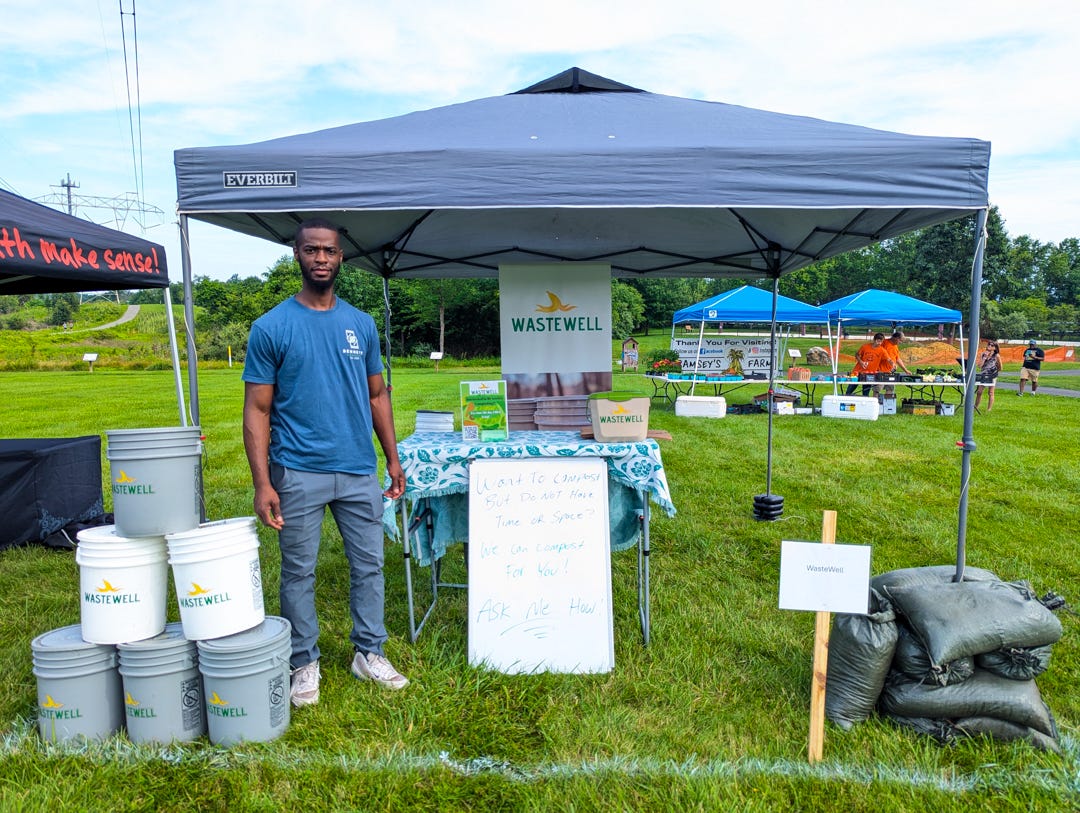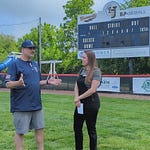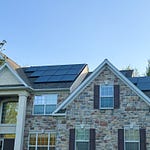Isn’t composting gross? 💩 Isn’t composting hard? Where do you start if you want to compost at home?
Today, I'm introducing you to WasteWell, a local curbside composting company that helps you compost your food scraps and reduce your trash without any of the “ick.”
tl;dr: You place your food scraps in a bucket at the end of your driveway every two weeks. WasteWell empties your bucket, and voilà! No food scraps in your trash that ultimately spew methane from the landfill and heat the planet. 🫶🏼 (WasteWell works like your trash service… but better, because it doesn’t go to a landfill.)
I've long been a composting nerd, hoping to inspire all families to find a way to compost at home that works for them. Composting is a significant step we can take toward living more sustainably, reducing our impact on the planet, and helping to heal the environmental damage caused by our bad habits and overconsumption.
John Williams owns WasteWell and has extensive experience in the industry, having worked with Bennett Compost in Philadelphia for many years.
✨ Fun fact: I started WasteWell in 2020. I was thrilled to pass it along to John a couple of years ago. He has far more experience in the industry. He's more qualified and connected with other composting experts, so he’s better positioned to lead WasteWell into its next stage of life. I love watching it grow!
Composting may sound a little crazy today, as many of us are not accustomed to separating organic waste. Although I think it’s becoming more mainstream, albeit slowly.
We already sort our waste by type with recyclable products like aluminum, cardboard, and plastic. A few decades ago, separating recyclables sounded kooky, crunchy, and confusing. Yet now most of us separate recyclables without a second thought.
Most of us will eventually separate our food scraps and other organic waste without a second thought as well. We might look back and wonder what we were thinking, sending all our precious, nutrient-rich food scraps to landfills to turn into greenhouse gases that contribute to global warming.
Alternatively, we can direct them to compost facilities, where they become finished compost that helps rebuild our soil, protect our waterways, and mitigate climate change. Doesn’t it sound crazy not to compost?
To learn more, check out the interview above with John or visit the WasteWell website. There was a lot of background noise, so we are a bit hard to hear. Hopefully, the closed captioning helps! More tech folly… 🤦🏼♀️I included the transcript at the bottom of the post, too, in case the closed captions went awry.
If you’re new to WasteWell, you can use my referral code to get $5 off when you sign up. Or don’t use it, it’s up to you. 💛
Got any questions? I’d be happy to answer them!
Jen: Hey everyone, I am Jen with Connect Chadds Ford. I'm here with John Williams from WasteWell and he's going to tell us a little bit about this curbside composting company and how it impacts our community.
So John, why don't you take it away, tell us a little bit about what is WasteWell and what is its role in the community.
John: So WasteWell is a composting company.We offer residential and drop-off services. We also offer commercial services.
Jen: Great. So can you tell us a little bit more about those services? So we'll start with the residential services. What exactly does that mean? What do you do for a customer?
John: So residential, we drop off a five-gallon bucket. We come past biweekly and collect your bucket. We also offer a 30-day free trial on it.
Jen: Great. And I can tell you, as I'm a residential customer, and so it feels a lot like getting your trash picked up. You put it at the end of your driveway or outside your door if you're living in a multi-family type of community. They come, they empty it, they leave your bucket, and then you just do the same thing in two weeks. So it's so easy.
Can you tell us a little bit about commercial services as well? So what does that entail?
John: So the commercial services, we offer a 32-gallon toter. It's like a trash can, one of the average trash can. We come past weekly to get it with commercial pickups. Yeah, that's what we offer.
Jen: So it's sort of like a bulk service for businesses where you're picking up more at one time and then you can create different contracts with those businesses also to make sure that it suits them. That's great.
Tell us a little bit about, I know this is not your first rodeo in composting, so tell us a little bit about your experience in the industry before WasteWell.
John: Yeah, so I work for Bennett Compost. I've been working for Bennett Compost for eight years. And, you know, I started off as a collector. And from there, I just grew to love, you know, the concept of composting. And it's just like, you know, like I learned more about concept. And, you know, that's the place where I wanted to do more for communities and people.
Jen: And bring those services that the city got out to the suburbs, which is great. Yeah, that's awesome.
So, I'm a big composting nerd, so I can definitely appreciate, like, you know, getting excited about dirt and worms and soil and all that good stuff. So, what do you hope to achieve in the next couple of years with WasteWell in this area? Like, how do you hope to grow, or what's your vision for this area?
John: So, my goal is to, you know, engage with the community more, you know, like, join in more, go to farmers markets where the community can come up and have a conversation, spread information. At farmer's markets I talk to a lot of people. The don't really know what composting is. Put my food scraps in the trash. Then they get a bucket. They notice the difference. Less smells, rodents.
Jen: Yeah, it's crazy. Like, my husband, who is not an eco nerd at all, has said so many times, like, it's kind of wild how much your trash decreases when you start composting.
And you think, like, oh, it's just this five-gallon bucket. It's not going to make that much of a difference. But it does make a huge difference. And I don't really know exactly why, to be honest, but, like, all of a sudden, your trash goes down so much.
You know, we're a family of four, and we, since we started composting, sometimes you'll have like one bag of trash for the entire week, which is way different than what it used to be. So really like significant declines in the trash, which is great.
Last and most important question for those people who are interested in learning about WasteWell, signing up, encouraging their neighbors to sign up, where can they get that information and how can they sign up?
John: You can go to our website. Mywastewell.com. You can meet us at local farmers' markets.
Jen: I love it. Thanks so much. We'll be sure to include links to the website so that people can head directly there in the notes below this video. And hopefully people will reach out and sign up.
So thanks so much for chatting today, John. I really appreciate it.















Share this post